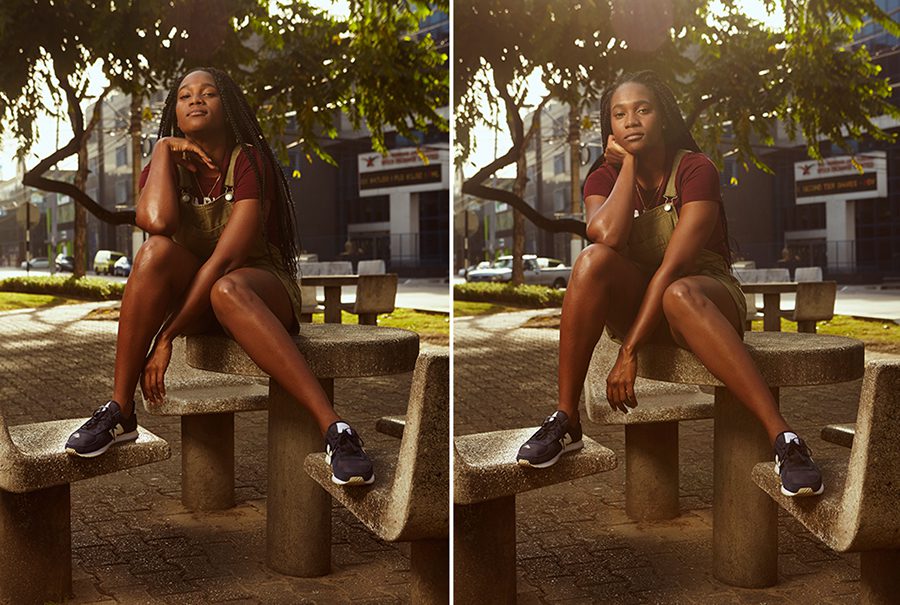

June 01, 2018
When we first encountered Shari Petti’s video short ‘Small Lime,’ we were immediately intrigued. The series captured 20-something-year-old local Trinis, discussing everything from local culture to pop culture to politics. They were funny. They were smart. And the girl had an eye!
‘Sorf Hair,’ Shari’s 2017 Trinidad+Tobago Film Festival’s People’s Choice Award winning documentary was even more impactful, inspiring us to learn more about this Morvant born, Bishops educated filmmaker.
We met with Shari to discuss her love of acting and theatre, her desire to see familiar people and places and the impact it has on how we see ourselves.
“I feel like seeing people that look like you and places that look like where you come from has such an impact on how you see yourself. Not that I realized that fully when I was younger but, when it was no longer there, I realized that’s what I missed. Which is why it’s very important to me to create the type of films I do.”
Let’s start with your background… You’re from Morvant, right? I’ve heard you proudly proclaim your hometown at screenings. What influences that extreme pride?
SHARI: Growing up in Morvant, you grow up knowing that people don’t expect much from you and that they have very narrow ideas about you. I really hate the stereotype because I know a lot of people from Morvant who do really great things and have pride in what they do. So, for me, it’s important to say, “I’m from Morvant!”
I want people to know where I’m from.
And where did your passion for film come from?
SHARI: Yes. I was always into acting. Every now and then, I’d get a small roll in a commercial or short film, but the first full film I ever worked on was Bazodee.
I was at a meeting one day for another project and I met Leslie Ann Wills-Caton who was the second assistant director of the film and who eventually became my mentor. At first, I was on set as an extra but I asked her if I could come through and work on the film and, luckily, she said yes! So I started as a production assistant, which really means I was cleaning toilets and picking up garbage on location, but after that she called me back to work on other films.
And after Bazodee?
SHARI: After Bazodee, I worked on the set of ‘Play the Devil,’ ‘The Apartment’ and ‘The Cutlass.’ I also worked at PixelPlay Media for a while, then on a lot of commercials because there weren’t many major films in production at the time.
But it gave me time to start exploring more of my own personal work and developing my personal craft. While working on a lot of these projects, I got to see how things work. Even when I was bringing coffee, I got to see how lighting works and how they set up the camera for different shots, what was happening in the art department and what the grips were doing. From there, I was hooked and I decided to go to UWI to study film full time.
Was that when you first picked up a camera?
SHARI: Believe it or not, in my first two semesters in UWI, I didn’t touch a camera. My mentors were all producers and directors, so I wasn’t even thinking about picking up the camera. I thought I wanted to be a producer but that changed when I realized I prefer to be more hands on creatively.
I finally got my first camera in March 2016. And, the first day that I started using it, I shot the first episode of ‘Small Lime.’ At the time, I didn’t know it was going to be the first episode of anything yet. It was just me, shooting my friends while they were talking.
Some months later, I was sorting through the footage and thought the conversation was pretty cool, so I started editing it.
It actually felt like a lot of pressure to name the first episode and recognize that it really was Episode 1 because now it meant that I’d have to do an episode 2. I’d have to commit to this!
So I did a yearlong documentary course at UWI and that just made me all the more committed to telling stories that way. Shooting more, creating more… When people started reacting to them online, that motivated me even more!
Tell us more about the concept behind ‘Small Lime.’ Why was that the direction you decided to go in and what was the initial feedback like?
SHARI: When I first started shooting, I was just documenting a conversation. I had no idea what I would do with it and there was no particular topic but I decided I could do it again. This time, I wanted to focus on topics that young people think about and talk about; topics that need a platform for a wider audience to see and hear.
My friends and I talk about social and political issues all the time. So many things happen in Trinidad all the time so I decided to call up some of those friends who had things to say and start recording them.
At first, I was really worried about people not taking to the content because it was so serious and so conscious. I was worried that people would only be interested in fun stuff and a cheap laugh so I was worried that no one would support it, but people reacted really well. Especially on Facebook, the more popular videos got views in the tens of thousands and that was really shocking for me!
I didn’t want to buy into the idea that Trinis only want to laugh. If it was appealing and entertaining and really well edited, I believed that people would buy into it and they did.
Did that inspire you to start shooting ‘Sorf Hair’? How did that project begin?
SHARI: ‘Sorf Hair’ was created from almost nothing. During filming, I brought water and snacks from home for the cast and crew. Leslie Ann, who was also my associate producer, once had to give me money to hire a car when no one could give me a ride. So, I really didn’t have much of a budget. The people who worked with me were all classmates and friends who travelled with their own money to get to the shoots.
To see something made that way – and then see the end result – made me really happy: it was aesthetically pleasing and impactful and had legitimate reach! It boosted my confidence and encouraged me to continue to create. Now, I think about what I could be capable of making with an actual budget.
You won the People’s Choice Award for ‘Sorf Hair’ at the 2017 Trinidad+Tobago Film Festival. What was that whole experience like? How did it feel to win?
SHARI: I really didn’t expect it. I didn’t get any nominations so I wasn’t at the Awards Ceremony. I was at Movietowne and on the way home, walking down Wrightson Road, my phone started blowing up with people texting to tell me I won! So I ran down to the Central Bank Auditorium to collect the award.
For me, winning the People’s Choice Award gave me an idea of how many people were probably touched by the film. I was surprised to see how many people came out to see something I made and then vote for it enough to win.
Did you enter ‘Sorf Hair’ in any other festivals?
SHARI: ‘Sorf Hair’ showed at the Caribbean Tales International Film Festival, the Pembroke Taparelli Film Festival, the Barbados International Film Festival, the Pan African Film Festival and is actually nominated in the documentary short category, my first and only jury nomination for the film.
PAFF is actually a huge personal achievement for me. It’s the largest black film festival in the US and, a while back, I wrote in my journal that I want to have a film to show there in the next five years, when I have more solid work. I actually hesitated submitting my film because I thought they wouldn’t accept it. It wasn’t until the night of the deadline that I submitted because I was so hesitant. So I’m really glad it was selected!
Thankfully, I was able to make it to LA to see my film and I had an amazing time there. It was so heartwarming to hear a foreign audience react to my work. Some people laughed and made comments throughout the entire film – they actually got it, which shows how universal the story is.
I also had a really great time just being in the US. I met a lot of great people who gave me some really valuable advice and motivated me to keep working hard at my craft. I also got to meet one of my favourite filmmakers and actresses, Issa Rae, who I’ve been obsessed with since I was 14 years old. She is actually one of the people who inspired me to pursue making content online. Meeting her made my dreams and goals feel so much more attainable. It was such a priceless experience!
The music curation and soundtracks of your films – what influences your choices? I know you mentioned Ozy Merrique…
SHARI: Music, for me, is very important. I grew up on a lot of good music and I’m influenced by a lot of old school music, especially old calypsos, jazz and stuff… Right now I’m into contemporary productions that are based on calypso and jazz, like Ozy. He does a lot of remixes to old calypsos or samples old calypsos and rapso. I also think 3Canal is very fresh – I’ve been obsessed with their music for as long as I’ve known myself.
That’s why for ‘Sorf Hair’ I reached out to Baidawi (aka Detnator) and he was able to remix a lot of those old calypsos that related to hair and skin and identity. That’s how I was able to add my own personal music style to my film.
What are your plans for after UWI?
SHARI: I want to do my MFA in Film. I’m not sure where exactly as yet but, before I do, I want to see how far I get in the next two or three years by doing my own stuff, pushing content and getting it out there.
I want to create work that really represents Caribbean people authentically.
When I was younger, I used to watch a lot of Channel 4 and TTT and they showed a lot of local content like Doctor Beulah and plays by Freddy Kissoon. I didn’t have cable during most of my childhood so my whole life was just a lot local stuff. When we finally got cable, TTT was no longer around and you rarely ever saw local shows. That was really disappointing.
Disappointing…
SHARI: Disappointing because I didn’t see anything I could relate to. A lot of my favourite shows were local and I wasn’t seeing them anymore.
I feel like seeing people that look like you and places that look like where you come from has such an impact on how you see yourself. Not that I realized that fully when I was younger but, when it was no longer there, I realized that’s what I missed: seeing something I could relate to, which is why it’s very important to me to create the type of films I do.
Now I plan to collaborate with friends and create a hub online for local content. Even if it’s just short stuff, documentaries, short films, short series… We have our faces out there. We see ourselves. Even if it’s just on Youtube right now.
When you search Trinidad series or videos online, I want there to be something there. Not just one or two videos, but a full resource. That’s what I’m trying to build with my friends.
I want to continue making high quality content that won’t just be watched by people in the Caribbean, but also by people in the US and Europe – so that they can see what life in the Caribbean is really like. Not just the tourist version or a place filled with crime. There’s so much more to us!



INTERVIEWER: TANYA MARIE PHOTOGRAPHER: MARLON JAMES